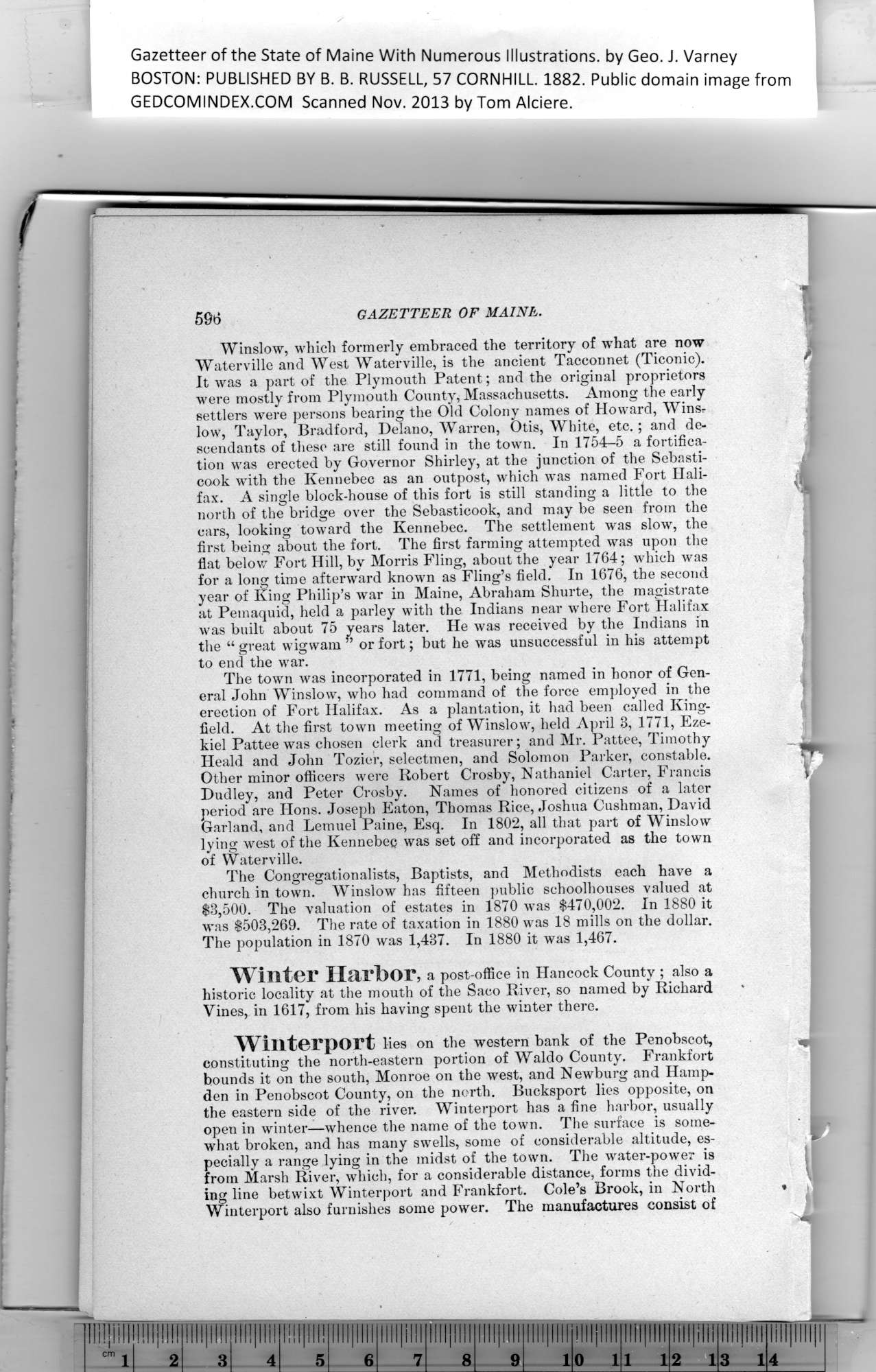|
Gazetteer of the State of Maine With Numerous Illustrations, by Geo. J. Varney
BOSTON. PUBLISHED BY B. B. RUSSELL, 57 CORNHILL. 1882. Public domain image from
59^5 GAZETTEER OF MAINE.
Winslow, which formerly embraced the territory of what are now
Waterville and West Waterville, is the ancient Tacconnet (Ticonic).
It was a part of the Plymouth Patent; and the original proprietors
were mostly from Plymouth County, Massachusetts. Among the early
settlers were persons bearing the Old Colony names of Howard, Wins-
low, Taylor, Bradford, Delano, Warren, Otis, White, etc.; and de-
scendants of these are still found in the town. In 1754-5 a fortifica-
tion was erected by Governor Shirley, at the junction of the Sebasti-
cook with the Kennebec as an outpost, which was named Fort Hali-
fax. A single block-house of this fort is still standing a little to the
north of the bridge over the Sebastieook, and may be seen from the
cars, looking toward the Kennebec. The settlement was slow, the
first being about the fort. The first farming attempted was upon the
flat below Fort Hill, by Morris Fling, about the year 1764; which was
for a long time afterward known as Fling’s field. In 1676, the second
year of King Philip’s war in Maine, Abraham Shurte, the magistrate
at Pemaquid, held a parley with the Indians near where Fort Halifax
was built about 75 years later. He was received by the Indians in
the “ great wigwam ” or fort; but he was unsuccessful in his attempt
to end the war.
The town was incorporated in 1771, being named in honor of Gen-
eral John Winslow, who had command of the force employed in the
erection of Fort Halifax. As a plantation, it had been called King-
field. At the first town meeting of Winslow, held April 3, 1771, Eze-
kiel Pattee was chosen clerk and treasurer; and Mr. Pattee, Timothy
Heald and John Tozier, selectmen, and Solomon Parker, constable.
Other minor officers were Robert Crosby, Nathaniel Carter, Francis
Dudley, and Peter Crosby. Names of honored citizens of a later
period are Hons. Joseph Eaton, Thomas Rice, Joshua Cushman, David
Garland, and Lemuel Paine, Esq. In 1802, all that part of Winslow
lying west of the Kennebec was set off and incorporated as the town
of Waterville.
The Congregationalists, Baptists, and Methodists each have a
church in town. Winslow has fifteen public schoolhouses valued at
$3,500. The valuation of estates in 1870 was $470,002. In 1880 it
was $503,269. The rate of taxation in 1880 was 18 mills on the dollar.
The population in 1870 was 1,437. In 1880 it was 1,467.
Winter Harbor, a post-office in Hancock County ; also a
historic locality at the mouth of the Saco River, so named by Richard
Vines, in 1617, from his having spent the winter there.
Willterport lies on the western bank of the Penobscot,
constituting the north-eastern portion of Waldo County. Frankfort
bounds it on the south, Monroe on the west, and Newburg and Hamp-
den in Penobscot County, on the north. Bucksport lies opposite, on
the eastern side of the river. Winterport has a fine harbor, usually
open in winter—whence the name of the town. The surface is some-
what broken, and has many swells, some of considerable altitude, es-
pecially a range lying in the midst of the town. The water-power is
from Marsh River, which, for a considerable distance, forms the divid-
ing line betwixt Winterport and Frankfort. Cole’s Brook, in North *
Winterport also furnishes some power. The manufactures consist of
PREVIOUS PAGE ... NEXT PAGE
This page was written in HTML using a program written in Python 3.2
|
